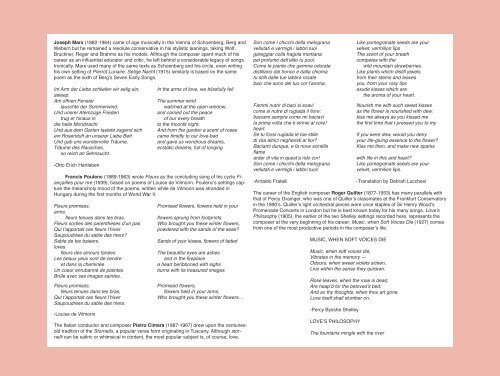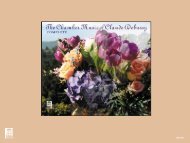DE 3029 - Delos Productions, Inc.
DE 3029 - Delos Productions, Inc.
DE 3029 - Delos Productions, Inc.
You also want an ePaper? Increase the reach of your titles
YUMPU automatically turns print PDFs into web optimized ePapers that Google loves.
Joseph Marx (1882-1964) came of age musically in the Vienna of Schoenberg, Berg and<br />
Webern but he remained a resolute conservative in his stylistic leanings, taking Wolf,<br />
Bruckner, Reger and Brahms as his models. Although the composer spent much of his<br />
career as an influential educator and critic, he left behind a considerable legacy of songs.<br />
Ironically, Marx used many of the same texts as Schoenberg and his circle, even writing<br />
his own setting of Pierrot Lunaire. Selige Nacht (1915) similarly is based on the same<br />
poem as the sixth of Berg’s Seven Early Songs.<br />
Im Arm der Liebe schliefen wir selig ein,<br />
asleep.<br />
Am offnen Fenster<br />
lauschte der Sommerwind,<br />
Und unsrer Atemzüge Frieden<br />
trug er hinaus in<br />
die helle Mondnacht.<br />
Und aus dem Garten tastete zagend sich<br />
ein Rosenduft an unserer Liebe Bett<br />
Und gab uns wundervolle Träume,<br />
Träume des Rausches,<br />
so reich an Sehnsucht.<br />
-Otto Erich Hartleben<br />
In the arms of love, we blissfully fell<br />
The summer wind<br />
watched at the open window,<br />
and carried out the peace<br />
of our every breath<br />
to the moonlit night.<br />
And from the garden a scent of roses<br />
came timidly to our love-bed<br />
and gave us wondrous dreams,<br />
ecstatic dreams, full of longing.<br />
Francis Poulenc (1889-1963) wrote Fleurs as the concluding song of his cycle Fiançailles<br />
pour rire (1939), based on poems of Louise de Vilmorin. Poulenc’s settings capture<br />
the melancholy mood of the poems, written while de Vilmorin was stranded in<br />
Hungary during the first months of World War II.<br />
Fleurs promises,<br />
arms,<br />
fleurs tenues dans tes bras,<br />
Fleurs sorties des parenthèses d’un pas<br />
Qui t’apportait ces fleurs l’hiver<br />
Saupoudrées du sable des mers?<br />
Sable de tes baisers,<br />
loves.<br />
fleurs des amours fanées<br />
Les beaux yeux sont de cendre<br />
et dans la cheminée<br />
Un coeur enrubanné de plaintes<br />
Brûle avec ses images saintes.<br />
Fleurs promises,<br />
fleurs tenues dans tes bras,<br />
Qui t’apportait ces fleurs l’hiver<br />
Saupoudrées du sable des mers.<br />
-Louise de Vilmorin<br />
Promised flowers, flowers held in your<br />
flowers sprung from footprints.<br />
Who brought you these winter flowers,<br />
powdered with the sands of the seas?<br />
Sands of your kisses, flowers of faded<br />
The beautiful eyes are ashes<br />
and in the fireplace<br />
a heart beribboned with sighs<br />
burns with its treasured images.<br />
Promised flowers,<br />
flowers held in your arms,<br />
Who brought you these winter flowers…<br />
The Italian conductor and composer Pietro Cimara (1887-1967) drew upon the centuriesold<br />
tradition of the Stornello, a popular verse form originating in Tuscany. Although stornelli<br />
can be satiric or whimsical in content, the most popular subject is, of course, love.<br />
Son come i chicchi della melograna<br />
vellutati e vermigli i labbri tuoi<br />
gareggiar colla fragola montana<br />
pel profumo dell’alito tu puoi.<br />
Come le piante che gemme odorate<br />
distillano dal tronco e dalla chioma<br />
tu stilli dalle tue labbra rosate<br />
baci che sono del tuo cor l’aroma.<br />
Fammi nutrir di baci si soavi<br />
come si nutre di rugiada il fiore:<br />
baciami sempre come mi baciavi<br />
la prima volta che ti strinsi al core!<br />
heart.<br />
Se tu fossi rugiada le tue stille<br />
di vita altrici negheristi al fior?<br />
Baciami dunque, e fa nove scintille<br />
flame<br />
arder di vita in quest’a rido cor!<br />
Son come i chicchi della melograna<br />
vellutati e vermigli i labbri tuoi!<br />
-Arnaldo Frateili<br />
Like pomegranate seeds are your<br />
velvet, vermilion lips<br />
The scent of your breath<br />
competes with the<br />
wild mountain strawberries.<br />
Like plants which distill jewels<br />
from their stems and leaves<br />
you, from your rosy lips<br />
exude kisses which are<br />
the aroma of your heart.<br />
Nourish me with such sweet kisses<br />
as the flower is nourished with dew:<br />
kiss me always as you kissed me<br />
the first time that I pressed you to my<br />
If you were dew, would you deny<br />
your life-giving essence to the flower?<br />
Kiss me then, and make new sparks<br />
with life in this arid heart?<br />
Like pomegranate seeds are your<br />
velvet, vermilion lips.<br />
-Translation by Debrah Lucchesi<br />
The career of the English composer Roger Quilter (1877-1953) has many parallels with<br />
that of Percy Grainger, who was one of Quilter’s classmates at the Frankfurt Conservatory<br />
in the 1890’s. Quilter’s light orchestral pieces were once staples of Sir Henry Wood’s<br />
Promenade Concerts in London but he is best known today for his many songs. Love’s<br />
Philosophy (1905), the earlier of the two Shelley settings recorded here, represents the<br />
composer at the very beginning of his career; Music, when Soft Voices Die (1927) comes<br />
from one of the most productive periods in the composer’s life.<br />
MUSIC, WHEN SOFT VOICES DIE<br />
Music, when soft voices die,<br />
Vibrates in the memory —<br />
Odours, when sweet violets sicken,<br />
Live within the sense they quicken.<br />
Rose leaves, when the rose is dead,<br />
Are heap’d for the beloved’s bed;<br />
And so thy thoughts, when thou art gone,<br />
Love itself shall slumber on.<br />
-Percy Bysshe Shelley<br />
LOVE’S PHILOSOPHY<br />
The fountains mingle with the river




